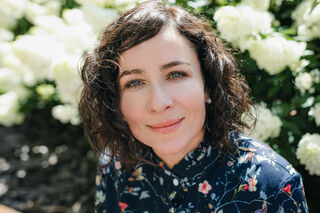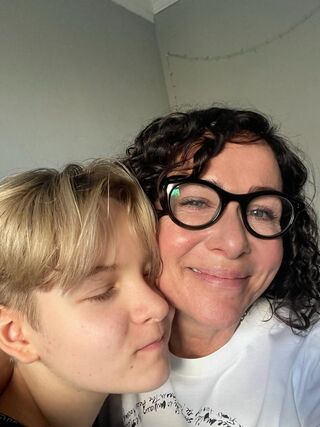Trauma
How Trauma, Loss, and Anxiety Can Lead to Transformative Growth
"There is no important reality other than inner reality."
Posted June 10, 2022 Reviewed by Tyler Woods
Key points
- Studies show that acute trauma can improve psychological health and create post-traumatic growth.
- An example is the case of a Ukrainian psychologist, who describes her trauma and the lessons it taught her.
- "In my case, I found that life can give you a parachute, but that parachute will only appear if you jump."

An ever-growing body of research shows that trauma can bring post-traumatic growth. In a 2019 study published in Health and Social Works, for example, 99 percent of survivors of serious road trauma reported experiences of post-traumatic growth. Researcher Anthony Mancini (2019) showed in a study in Psychological Review how acute adversity can actually improve psychological health.
As an example of how a deep trauma can bring post-traumatic growth, we can all learn a life lesson from psychologist Natalia Lomonosova of Ukraine. Three months ago, when she and her daughter fled from Kyiv to Germany, leaving everything behind, she was interviewed for this site by PT editor-in-chief Kaja Perina. Recently, my husband and I met Natalia in Germany to talk about her experience and her growth.
What did you learn about yourself in the last 3 months?
1. You can't lose yourself. I learned that, even if you lose everything else, you need to do everything you can not to lose yourself. I have lost everything, but I can’t and won’t lose myself.
2. Everything I thought I owned was an illusion. Everything that I thought I had (material things, money) was an illusion and was unimportant. I realize now that the only thing that matters in the world for me is people and their kindness. People I met gave me material support, strength, and wisdom.
3. There is no important reality other than inner reality. The only important thing is how I feel about what is happening. It's not what happens that hurts people, but how they interpret it.
4. Never lose hope. Now I see my life before as a constant rise to my peak, from which, because of the war, I had to jump, leaving everything, clutching my daughter's hands, and closing my eyes in horror. It was a leap of faith.
In my case, I found out that life can give you a parachute, but that parachute will only appear if you jump. I jumped and was rescued by perfect strangers.
Hope is one of the few resources responsible for our peace in the present. Never lose your hope.
5. There is no permanent “me." “Me” is a process, a self-creating and self-sustaining process. Self-confidence and happiness are not a given, but a habit. If you make self-confidence and happiness a habit, then, even if you lose everything as I did, you will know how to return to that habit.
6. Hatred leads to a vicious circle of destruction, whereas goodness leads to a virtuous circle of love. Good and evil are very important concepts, and we need to teach them to our children. Hatred leads to more hatred and anger breeds more anger, which leads to devastation and destruction. Goodness, on the other hand, breeds more goodness, which creates a virtuous circle of positive energy. We have to stay away from hatred and love ourselves, love people, and love life.
7. Acceptance is a strength. Acceptance is not a weakness, but a strength. We cannot change the past and we need to accept what happens to us even if there are unpleasant difficulties. If we look for easier ways, we’ll be surprised. Everywhere will be difficulties.
What has happened in the three months since your first interview with Psychology Today?
One hundred days have passed since the morning of February 24, when, at 5 a.m., I woke up in my bed to the sounds of bombing. It shook the whole of Ukraine, my Kyiv, my house, and all my insides. I couldn't believe this was happening.
My 15-year-old daughter and I had absolutely no money. We were stunned by what had happened, shocked, exhausted, and, at times, in complete despair. We were vulnerable and defenseless and completely dependent on other people.
On the way out of Kyiv, we met people, both those who sincerely wanted to help us and those who used our misfortune to assert themselves or make a profit. Thus began our run through Europe in search of a place where we could rest and recover.
We were denied shelter and were given shelter. We were taken in and driven out into the street at night, thrown out on the road, and picked up on the road. Everything was taken away from us, and then people we didn’t know, perfect strangers, gave us everything: housing, clothes, food, money. I now live in my own rental apartment in Homburg, Germany with my daughter and our dog.
How do you see your life now?
My life is really divided into before and after the trauma of losing everything.
Before, I doubted myself all the time. I was worried about what people thought of me. I tried to “be good,” and, I must admit, in the depths of my soul, I was afraid of people. Then there is my life after, where I'm actually experiencing post-traumatic growth.

Can you describe that post-traumatic growth?
I have become calm and self-confident. I am more interested in the present. I appreciate my strengths and my shortcomings no longer bother me.
I overestimated some of my relationships. Without regret or guilt, I broke off those relationships that had weighed me down for years. Without fear, I opened myself up to new relationships. It turns out that I now have real friends—and these are completely different people from the friends I had before.
The main thing is that I discovered that a lot of people are good people who can really be trusted. I am now convinced that life is beautiful and wonderful in its essence, and this discovery shocks me even more than the war.
I experienced a “second birth” which was terribly scary and painful, but I like the new me more, and my new life—albeit from scratch—attracts me with opportunities rather than scares me with uncertainty.
I'm not sad about the losses. The Chinese character for "sad person" helps me. It is a picture of a man walking backward. I have decided not to be that sad person. I am turning my face towards the future, towards life, and I feel clarity, lightness, and energy. I smile in the morning, and I love my daughter even more. I treasure my new friends. The old skin is shed, and I feel younger and stronger than I used to be.
What are your plans for the future?
Maybe I will write a book about how I was able to go through all this, like a thin needle and thread through the multi-colored beads of events, collecting the necklace of my life, which I will wear with gratitude.




